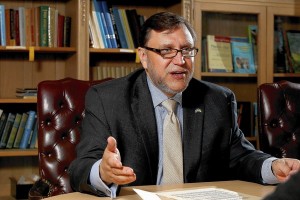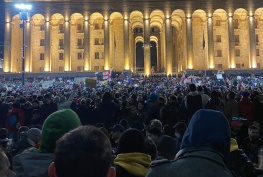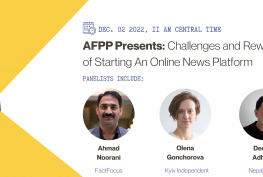By Anastasia Forina, Tribune reporter
Some 200,000 Ukrainians live in the Midwest, including 85,000 in Illinois, and a record 1,600 came to Ukraine’s Chicago consulate May 25 to vote in the presidential elections, said Andriy Pravednyk, who has been consul general of Ukraine to Chicago since November 2012.
What follows is an interview with Pravednyk, which has been edited for brevity and clarity.
Q: What does it mean for Ukraine to elect a new president?
A: The election of a new president has significant effect for Ukraine and for the international community, since it puts aside the issue of the legitimacy of Ukrainian government. From now on, the Russian Federation has no grounds to claim that Ukrainian government is illegitimate, as it used to say.
It’s also important since we have a president who will be able to start implementing a number of reforms, bringing to an end the separatist and terrorist activities in eastern Ukraine and to start real economic reforms and bring Ukraine closer to Europe.
Q: How do you think President-elect PetroPoroshenko, a businessman and also formerminister of economic development and formerforeign minister of Ukraine, will approach economic development?
A: The president-elect has already expressed his readiness to sign the economic part of the Ukraine-European Union Association Agreement because it provides a number of tools which are necessary for the development of the Ukrainian economy. And I’m sure that after that, the president will focus his attention on the development of infrastructure as well as bringing the economy of our country back on track.
Q: Poroshenko has said he’ll do everything in his power to stop violence in eastern Ukraine. How will he accomplish this?
A: That implies that anti-terrorist operation will go into so-called active phase, making sure that terrorists and separatists in eastern Ukraine are dislodged. It will definitely take more time, but the law enforcement agencies will be able to bring peace and security to the Donetsk and Luhansk regions.
Q: There was an attempt on behalf of four Chicago aldermen and representatives of the Ukrainian community in Chicago in March to suspend the sister city agreement between Moscow and Chicago as a response to Russian annexation of Crimea. Why do you think it wasn’t successful?
A: I provided members of City Council with information on why we thought that step would be necessary. But unfortunately, City Council did not vote in favor of it.
(On April 2) the City Council adopted the resolution expressing support of Ukraine, condemning Russian aggression in Crimea and supporting the position of international sanctions on Russia and Russian officials and underlining the willingness of Chicago City Council and the city of Chicago to provide additional support to Ukraine in the form of projects between Chicago and Kiev.
Some will be in the sphere of cultural exchange, while Chicago’s 1871 center will provide technical and expert assistance to Bionic Hill, Ukraine’s version of Silicon Valley.
Also, Chicago-area hospitals are to provide some of their medical equipment to Kiev hospitals for medical assistance to people injured during the fighting in Maidan, the city’s main square. The plan is still being developed.
Q: What’s ahead between Chicago and Kiev under the sister city agreement?
A: We are planning to have “Days of Kiev” in Chicago in the second half of next year and we hope to bring a sizable delegation from Kiev to Chicago of businesspeople, singers, dancers, and probably a Ukrainian museum exhibition to show local Chicagoans we have something to be proud of.
Q: The consulate has made a family tree for Mayor Rahm Emanuel. Do you know which region his ancestors are from?
A: The mayor’s ancestors are mostly from Odessa region, but some came from Chernivtsi region, formerly a part of the Austro-Hungarian Empire. Probably, there are no more of (his) relatives in Ukraine, but his grand-grandfathers came from Ukraine.





